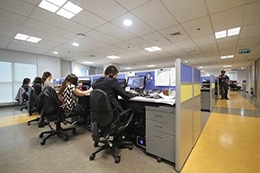The Philippines is included among the countries with the highest energy rates in Southeast Asia, according to a 2013 report from the National Statistical Coordination Board (NSCB). This makes sustainability and energy conservation primary concerns for the archipelago’s bustling commercial and industrial sectors.
“Offices and service stations have high energy demands,” said Dominque Espiritu, Senior Manager for Administration for SEAOIL Philippines. “Some of these places are strenuously at work round-the-clock.”
Last year, SEAOIL partnered with Philips to re-image
With a growing concern for energy savings, SEAOIL wanted to extend its partnership with the global leader in lighting to its head offices in Ortigas Center. SEAOIL holds office in 2 buildings in the area, occupying 3 floors totaling almost 3,000 sq meters.
“Lighting accounts for 19 percent of the world’s electrical consumption,” said Fabia Teteroo-Bueno, Country Manager of Philips Electronics. “There’s a great need to reduce energy consumption worldwide (not just in the Philippines), and lighting can play an integral role in this process.”
She continued: “With our partnership with Seaoil, the most important thing was to understand what their challenges were. When it comes to offices, sustainability, energy savings, and safety are prime considerations. But lighting systems also need to create an environment conducive to work.”
Philips LED lights were recently installed in two of SEAOIL’s offices in Ortigas, and this has helped the independent fuel company reduce its electrical bill significantly per month. Furthermore, Tetteroo-Bueno added, “These LED lights that were installed in SEAOIL have a service life of 14 years—meaning they won’t have to be replaced until 2028.”
Conventional versus LED lighting
According to Espiritu, SEAOIL entrusted with Philips its office lighting because it is one of the leading manufacturers in LEDs. He added that tapping Philips LED lighting not only brightened up their workplace but also added lighting aesthetics for their office convenience.
“Until we furnished our offices and gasoline stations with Philips LED lighting, we didn’t know that lighting could go brighter without consuming more electricity,” Espiritu remarked. “Furthermore, LED lighting became an essential tool in reducing the costs of our electricity without compromising quality.”
According to Philips, offices can save by up to 40 percent in their total electricity consumption if they will switch their lighting technology to smart LED solutions. Tetterroo-Bueno added: “Philips brought a whole new lighting technology that is anchored on energy efficiency without compromising the quality of light.”
Brighter light, better productivity
According to Tetteroo-Bueno, illumination plays an important role in setting the mood for different environments—including work spaces where it has a positive influence on productivity. “Yellow lights, for instance, are typically used in hotels and restaurants to induce relaxation,” explained Tetteroo-Bueno. “Brightly pronounced white lights, on the other hand, are used for offices to boost employee work potential.” In fact, different lights are recommended for meeting rooms compared to lights used at employees’ regular work stations. Philips is able to design, plan and make possible these special kinds of lighting arrangements in close coordination with partners.
Erika Ovenson, SEAOIL’s Vice President for Human Relations, said that the company’s two offices are now more conducive for work with the help of Philips LED lighting. She added, “With brighter LED lights in the office, our employees are inspired to work harder. These lighting systems help us to work effectively in our daily activities and they helped us feel more comfortable in our work place.”
Ovenson concludes: “Our office ambience is even better today with lighting customized according to our needs, and this became possible with Philips LEDs.”


